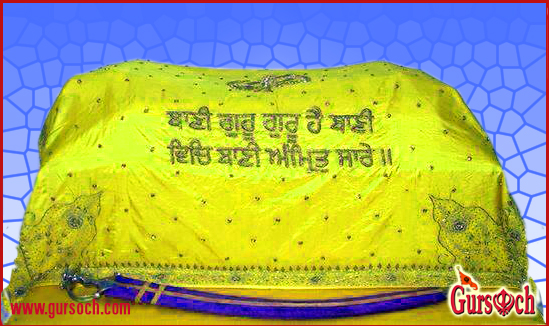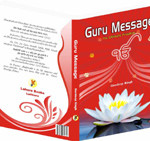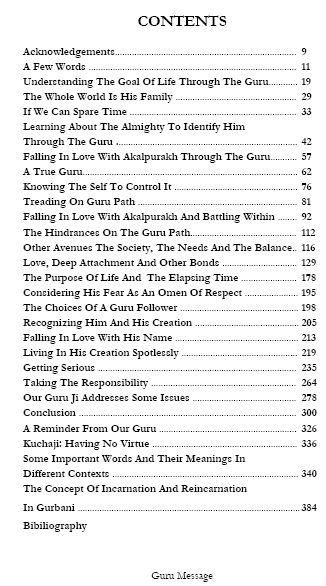
Bani guru, guru hai bani vich bani amrit saaray.
“Bani is Guru, and Guru is the Bani. Within Bani, all Ambrosial Nectars are found.” SGGS- 982
Naam is the Creator, and there is a universal-show being played; in that, His command also known as “Hukam or Ordinance” prevails. This Hukam is also expressed as “Shabad” in Gurbani. When we read the word “Naam”, it is referred to the Creator; when we utter His praise, it is His Naam-Simran. The word, “Shabad” is used in many contexts. Usually it is used for the Guru’s teachings, and also it is used for His Ordinance and Him. The word “Japna” means to utter but as one rises to that state of mind where mind is totally drenched in His love, this act occurs without the help of the tongue (AJAAP). It means to utter His Name repeatedly in such a way that His memory should be enshrined in the mind permanently. If His memory doesn’t come to us again and again, or our minds do not think about Him repeatedly, obviously, we are missing what Guru says in context of “Japna and Simran”.
In a separate chapter, I have tried to address some of very important words in detail, please keep them in your minds while studying Gurbani.
Guru Nanak Dev Ji in “Patti” states that this world is made to realize Akalpurakh. Just read it, on 433, SGGS, Patti Mehla 1:
ਪਪੈ ਪਾਤਿਸਾਹੁ ਪਰਮੇਸਰੁ ਵੇਖਣ ਪਰਮੇਸੇਸਰੁ ਵੇਖੇਖਣ ਕਉ ਪਰਪੰਚੰਚੁ ਕੀਆ ॥
ਦੇਖੇਖੈ ਬੂਝੂਝੈ ਸਭੁ ਕਿਛੁ ਜਾਣੈ ਅੰਤਰਿ ਬਾਹਰਿ ਰਵਿ ਰਹਿਆ ॥੨੪॥
Papai paatisaahu parmaysar vaykhan ka-o parpanch kee-aa.
Daykhai boojhai sabh kichh jaanai antar baahar rav rahi-aa. ||24|| {433}
In Essence : The king, Akalpurakh, has created this world so that the mortal can behold Him through it. He understands all beings and knows them all by pervading in and out.
ਫਫੈ ਫਾਹੀ ਸਭੁ ਜਗੁ ਫਾਸਾ ਜਮ ਕੈ ਸੰਗੰਗਲਿ ਬੰੰਿਧਿ ਲਇਆ ॥
ਗੁਰੁਰ ਪਰਸਾਦੀ ਸੇ ਨਰ ਉਬਰੇ ਜਿ ਹਰਿ ਸਰਣਾਗਤਿ ਭਜਿ ਪਇਆ ॥੨੫॥
Fafai faahee sabh jag faasaa jam kai sangal banDh la-i-aa.
Gur parsaadee say nar ubray je har sarnaagat bhaj pa-i-aa. ||25|| {433}
In Essence : This whole world is trapped in Maya and the chain of death; only those persons have got out of these traps who have quickly taken refuge of Akalpurakh through a Guru.
ਬਬੈ ਬਾਜੀ ਖੇਲੇਲਣ ਲਾਗਾ ਚਉਪੁਪੜਿ ਕੀਤੇ ਚਾਰਿ ਜੁਗੁਗਾ ॥
ਜੀਅ ਜੰਤੰਤ ਸਭ ਸਾਰੀ ਕੀਤੇ ਪਾਸਾ ਢਾਲਣਿ ਆਪਿ ਲਗਾ ॥੨੬॥
Babai baajee khaylan laagaa cha-uparh keetay chaar jugaa.
Jee-a jant sabh saaree keetay paasaa dhaalan aap lagaa. ||26|| {433-434}
In Essence : Akalpurakh is playing “chaupar” game, and “four ages” He has made His dice-cloth; all beings are like draught men (the characters that are moved as dice is thrown). He throws the dice (Thus characters-beings are moved to the final destination in the game).
ਭਭੈ ਭਾਲਹਿ ਸੇ ਫਲੁ ਪਾਵਹਿ ਗੁਰੁਰ ਪਰਸਾਦੀ ਜਿਨ ਕਉ ਭਉ ਪਇਆ ॥
ਮਨਮੁਖੁਖ ਫਿਰਹਿ ਨ ਚੇਤੇਤਹਿ ਮੂੜੂੜੇ ਲਖ ਚਉਰੁਰਾਸੀਹ ਫੇਰੇਰੁ ਪਇਆ ॥੨੭॥
Bhabhai bhaaleh say fal paavahi gur parsaadee jinH ka-o bha -o pa-i-aa.
Manmukh fireh na cheeteh moorhay lakh cha-oraaseeh fayr pa-i-aa. ||27|| {434}
In Essence : In fear (respecting Him and His Ordinance), those who search for Him, through Guru-blessings, obtain the fruit (of their search); (contrary to them) the mind-slaved-fools, do not remember Him and wander around (in vain) in numerous kinds of existences.
Guru Nanak Dev Ji doesn’t promote himself but the importance of adopting a true and a perfect Guru, and he also vigorously promotes falling truly in His love with the Creator; the Guru who sees His presence within can show it to others as well. Here I must quote Guru Vaakas that display the pangs of separation from the Creator. Being in those pangs, the personal urge tides up to be with Him. In that state too, His grace is sought; if we do not feel ever for the Creator the way our Guru has expressed, we are still sitting at the bottom of a peak of the mountain we intend to climb; those Guru Vaakas are on 243, SGGS, Gauri Shantt (by First Nanak):
ਗਉੜੀ ਛੰਤ ਮਹਲਾ ੧ ॥ ਸਿਣਿ ਨਾਹ ਪ੍ਰਭੂ ਜੀਉ ਏਕੇਕਲੜੀ ਬਨ ਮਾਹੇ ॥
ਕਿਉ ਧੀਰੈਗੈਗੀ ਨਾਹ ਬਿਨਾ ਪ੍ਰਭ੍ਰਭ ਵੇਪੇਪਰਵਾਹੇ ॥
ਧਨ ਨਾਹ ਬਾਝਹੁ ਰਹਿ ਨ ਸਾਕੈ ਬਿਖਮ ਰਿਣਿ ਘਣੇਰੇਰੀਆ ॥
ਨਹ ਨੀਦ ਆਵੈ ਪ੍ਰ੍ਰੇਮੇਮੁ ਭਾਵੈ ਸਿਣਿ ਬੇਨੇਨੰਤੰਤੀ ਮੇਰੇਰੀਆ ॥
ਬਾਝਹੁ ਪਿਆਰੇ ਕਿਇ ਨ ਸਾਰੇ ਏਕੇਕਲੜੀ ਕੁਰੁਰਲਾਏ ॥
ਨਾਨਕ ਸਾ ਧਨ ਮਿਲੈ ਮਿਲਾਈ ਬਿਨੁ ਪ੍ਰੀ੍ਰੀਤਮ ਦੁਖੁਖੁ ਪਾਏ ॥੧॥
Ga-orhee chhant mehlaa 1 :
Sun naah parabhoo jee-o aykalrhee ban maahay.
Ki-o dheeraigee naah binaa parabh vayparvaahay.
Dhan naah baajhahu reh na saakai bikham rain ghanayree-aa.
Nah need aavai paraym bhaavai sun baynantee mayree-aa.
Baajhahu pi-aaray ko-ay na saaray aykalrhee kurlaa-ay.
Naanak saa dhan milai milaa-ee bin pareetam dukh paa-ay. ||1|| {243}
In Essence : Oh my Master Prabh! Listen to my prayer! I am all alone in this world-jungle. Oh Carefree Prabh! How can I be at peace without you! The life-night is utter dark, how soul-bride can live without her Spouse-Prabh? Listen to my prayer my Master- Prabh! My heart is in love with you, and being separated from you,
I cannot have peace (sleep). Alone I cry as without beloved Prabh, no one is there to help me. Nanak says only then soul-bride can meet Prabh if He Himself unites her with Him (through Guru and with His grace), otherwise without Beloved Prabh, she suffers. We (Sikhs) must understand that our relation with our Creator is of a bride in love with her groom and a child with its father. Always we should remember what our Guru says. Trust me, our own wisdom doesn’t help us in this pursuit; therefore, it should be stopped from interfering with the Guru thought, Fifth Nanak states on 701, SGGS in raag Jaitsri:
ਅਬ ਮੈ ਸੁਖੁ ਪਾਇਓ ਗੁਰ ਆਗਿ´ ॥
ਤਜੀ ਸਿਆਨਪ ਚਿੰਤ ਵਿਸਾਰੀ ਅਹੰ ਛੋਡਿਓ ਹੈ ਤਿਆਗਿ´ ॥੧॥ ਰਹਾਉ ॥
Ab mai sukh paa-i-o gur aaga-y.
Tajee si-aanap chint visaaree ahaN chhodi-o hai ti-aaga-y. ||1|| Rahaa-o. {701}
In Essence : Now I have attained peace by obeying the Guru; I have abandoned my wisdom (cleverness), forgot anxiety and given up self conceit. [Pause]
Have we attained peace through our Guru? If not, obviously we are not fully obedient to our Guru. In above Vaakas, it is indicated that we should put full trust in the Guru. We should abandon the wisdom of our minds, and eradicate self conceit. Even our conceit alone becomes a big block in the way of following the Guru, because it convinces our minds that it doesn’t think wrong; in an effort of feeding it, our minds try to give new meaning to Guru advice. Only after eradicating the conceit, we can feel these Vaakas speaking our hearts.
It is very important to understand the following Guru advice, and we should make it a part of our lives without letting anyone or anything detour our minds from the Creator ever. First on 381, SGGS, Mehla 5:
ਮਾਇਆ ਕੀ ਕਿਰਤਿ ਛੋਡਿ ਗਵਾਈ ਛਿਡਿ ਭਗਤੀ ਸਾਰ ਨ ਜਾਨੈ ॥
ਬੇਦ ਸਾਸਤ੍ਰ ਕਉ ਤਰਕਨਿ ਲਾਗਾ ਤਤੁ ਜੋਗੋਗੁ ਨ ਪਛਾਨੈ ॥ ੨॥
Maa-i-aa kee kirat chhod gavaa-ee bhagtee saar na jaanai.
Bayd saastar ka-o tarkan laagaa tat jog na pachhaanai. ||2|| {381}
In Essence : A person who abandons routine life, and starts living alone (like a Sanyaasi), doesn’t understand the real meaning of devotional service to Akalpurakh. He debates on Vedas and Shastras, but he doesn’t understand the essence of real union with Akalpurakh.
Guru Ji disagrees with those who abandon family life, and who indulge in debates on Holy Scriptures in pretext of knowing the Creator.
We need to understand what the basics of Guru Message are. In simple words, what are those vital points Guru Ji wants us to understand? First point for instance, if our Guru says that Akalpurakh is beyond birth, he also says that those who are drenched in His love become like Him. Now question is this: should Guru-followers start saying that Akalpurakh takes birth individually? No, that belief will be distortion of Guru Message. Who become like Him are His creation [397, SGGS], but due to their behavior and obtained virtuous highest state of mind, no difference remains between them and the Creator in purity; He is eminently seen manifested in them. This is the way we should understand Guru Message instead of getting confused about it. Gurbani asks us to respect Him by respecting His devotees. Fifth Nanak states in Sawaye Mehla 1 that whoever meets (follows) Guru Nanak Dev gets out of the cycle of existences. This is the magic Akalpurakh performs through Guru Nanak Dev Ji; same way He does it through His other devotees as well. When we revere His true devotees, but forget HIM, we are missing the real message Guru Ji wants to impart to us. For the Sikhs, Guru Nanak Dev Ji is the highest of all, it doesn’t mean we don’t respect other enlightened ones who have led people to one Creator.
Do not let our psyche be tainted by some beliefs which have been floating around for centuries. For instance, the real Guru followers do not believe in caste system, because Guru Ji stresses on that [83, SGGS, First Nanak].
ਸਲੋਕ ਮ; ੧ ॥ ਫਕੜ ਜਾਤੀ ਫਕੜੁ ਨਾਉ ॥
ਸਭਨਾ ਜੀਆ ਇਕਾ ਛਾਉ ॥
ਆਪਹੁ ਜੇ ਕੋ ਭਲਾ ਕਹਾਏ ॥
ਨਾਨਕ ਤਾ ਪਰੁ ਜਾਪੈ ਜਾ ਪਤਿ ਲੇਖੈ ਪਾਏ ॥੧॥
Salok mehlaa 1: Fakarh jaatee fakarh naa-o.
Sabhnaa jee-aa ikaa chhaa-o.
Aaphu jay ko bhalaa kahaa-ay.
Naanak taa par jaapai jaa pat laykhai paa-ay. ||1|| {83}
In Essence : Useless is the belief (pride etc.) in caste and name (related to caste or high status, lineage). All the beings have support of the One-Creator. If one deems oneself good, he or she doesn’t become good, Nanak says that one is good only if one is accepted as honorable in His court. (Some people stoop so low that to justify their caste pride; they say that in Sri Guru Granth Sahib, with third and fourth Gurus’ names, their sir names Bhalla and Sodhi are referred by Baba Sunder Ji and Bhatas Ji. I have answer for that; it was only used to clarify the genuine Guru-ship shifted to one family to another after Guru Nanak Dev Ji’s heavenly departure; ponder over why Guru Sahiban do not mention “sir name” of Guru Nanak Dev Ji while talking about him anywhere else in Sri Guru Granth Sahib!
To remain sticking to castes is a curse for a Sikh, because it is a direct disobedience to the Guru. If Guru Ji says that pilgrimage is not worth in case one’s mind is filthy due to Maya influences and duality why some of his followers are still doing and promoting pilgrimages while being lost in Maya? Some people keep doing it on high scale without divorcing Maya-influences. Are they following the Guru?
Guru Ji says that Akalpurakh is known through a perfect Guru; for a Sikh, how any other person than Guru Nanak Dev Ji can become a perfect Guru in this pursuit? Third Nanak declares that Gurbani is actually the Guru, why then a Sikh needs other people to guide them as a Guru? Can Gurbani not guide us? Is it because it is hard to understand; well, Gurbani says that a Sikh can impart same Guru message to other Sikhs [444, SGGS, Mehla 4]. Gurbani stresses that Guru followers should remain in a contact with His Saints to live in His love. Should Sikhs just keep criticizing all Saints instead of searching for them? If real Saints are hard to find, why do Sikhs not get together to improve themselves as per Guru teachings? Please never forget that getting together is useful only if all participants have preferred Guru teachings to all other kind of knowledge.,……………………….Read full chapter by clicking on the below link









